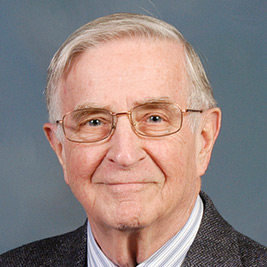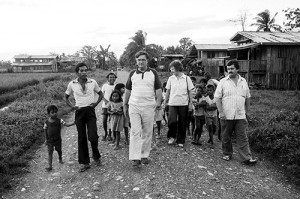
 John A. Lapp (center) and wife Alice Lapp and MCC Indonesia staffer Allen Harder (right) walk with residents of Agusan Village in northeastern Mindanao, Philippines. The Lapps joined Asia service workers at a regional retreat in 1986. (MCC Photo/Earl Martin)
John A. Lapp (center) and wife Alice Lapp and MCC Indonesia staffer Allen Harder (right) walk with residents of Agusan Village in northeastern Mindanao, Philippines. The Lapps joined Asia service workers at a regional retreat in 1986. (MCC Photo/Earl Martin)
John A. Lapp ’54, who started his career as a history professor at EMU, witnessed a major historical event himself – Martin Luther King’s “I Have a Dream” speech at a civil rights march in Washington D.C. in 1963. He remembers an atmosphere of joy and energy and a feeling that something historic was happening. “I will never forget the singing,” he says.
At the time, Lapp’s state of Virginia – and the rest of the South – was still segregated in favor of the white population. African Americans could not go to regular schools or eat in restaurants. They sat in the back of buses and in the balcony of theaters. They were not allowed to vote and were barred from many jobs.
Lapp was active in the Virginia Council on Human Relations, which fought for equal rights for African Americans and the end of segregation. The march in Washington by over 200,000 people was a big step forward in their campaign.
Following two years of alternative service as a conscientious objector to the military draft, Lapp taught at EMU from 1956-69, taking some time off to pursue a master’s degree at Case Western Reserve University in Cleveland and then a doctorate at the University of Pennsylvania in Philadelphia.
“I was restless in the 1960s,” he says, “and when a call came to direct the Peace Section at Mennonite Central Committee, I decided to get a leave from EMU.” At MCC in Akron, Pennsylvania, his worldview was greatly enlarged, he says.
After three years, Lapp got another call – to serve as dean of the faculty at Goshen College, a Mennonite school in Indiana. In 1979, he became provost, the second-ranked position under the college president. He lived in Goshen with his wife, Mary Alice Weber ’55, and family for 12 years. All three of their children – John Franklin, Jennifer and Jessica – graduated from Goshen College.
The call came again in 1985 to return to MCC as executive director of the relief, development and peace organization. During his tenure there, until 1997, he traveled to some 70 countries to visit MCC’s far-flung service workers, local partners and aid programs.
“I never applied for a job or planned a career beyond teaching,” Lapp says. “I tried to see my adult life as a calling from the church as a teacher and then in administration.”
Nancy Heisey, associate director under Lapp at MCC and now a Bible and religion professor at EMU, said the two often discussed the importance of leaders being kirchlich, a German word that is similar to “churchly” in English. “This means that in all your career and personal matters,” she says, “you see the central importance of the community of believers.”
After retirement, Lapp taught courses at Bishop’s College in India, Elizabethtown College in Pennsylvania and the Lancaster site of EMU.
Then he took on the monumental task of directing the Global Mennonite History Project under the auspices of Mennonite World Conference. He was responsible for recruiting writers, editing manuscripts, raising funds for the project and publishing five volumes – one for each of the five continents. The task took 16 years, ending earlier this year.
For most of his retirement years, Lapp stayed in Pennsylvania, where he and his wife grew up, but in 2011, they moved to Indiana at their children’s urging.
Now what? “At age 82, I don’t expect any more projects other than putting on paper some memories for the children and grandchildren,” he says.